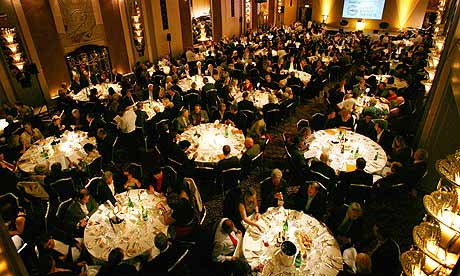
The Gold Badge awards were held in the fading opulence of the Park Lane Hotel ballroom.
Photograph: Anna Gordon
Procol HarumBeyond
|
|
PH on stage | PH on record | PH in print | BtP features | What's new | Interact with BtP | For sale | Site search | Home |
|
Gold Badge awards shine light on music's unsung heroes [see the Gold
Badge webpage here, and
a schedule of past winners]
After years of headlines about industry excesses and legal wrangles, awards show
another side to the music machine
 |
The Gold Badge Awards at the Park Lane Hotel The Gold Badge awards were held in the fading opulence of the Park Lane Hotel ballroom. Photograph: Anna Gordon |
For 36 years the Gold Badge awards have been a low-key affair conducted
behind closed doors – a quiet nod of appreciation to the unsung heroes of the
recording industry.
But after years of headlines about greedy executives and excessive megastars,
wranglings about copyright and file-sharing, the awards organisers wanted to
show another side to the music machine.
More than 300 industry professionals – from producers to publicists, songwriters
to arrangers – gathered in the fading opulence of the Park Lane Hotel's art deco
ballroom today, with not a single A-list celebrity in sight.
"For every big name, every star, there are tens if not hundreds of people
working behind them; today is about celebrating those people," said Patrick
Rackow, chief executive of the British Academy of Songwriters, Composers and
Authors (Basca), who hosted the event.
Among the award winners, one of the most instantly recognisable, if not exactly
fashionable, names was that of the television presenter and singer Aled Jones –
who said beforehand that he was delighted to receive an award. He did not attend
today's awards gathering.
"The Gold Badge awards always go to giants in the industry, so to see little old
me up there with them is quite humbling," he said in a telephone interview the
previous day. "It does make me feel old though – you have to have been around
forever to get one."
Somewhat apologetically, Lesley Douglas, a former controller of BBC Radio 2,
wrote that Jones would be "forever synonymous" with his 1985 hit Walking in
the Air, but was "much more" than that.
Jones brushed off the reference with the resigned dignity of a man who has
answered the same question for half of his life. "If I had a problem being
associated with that song, I'd be in the Priory rocking backwards and forwards
right now," he said.
Other awards were handed out to knowing applause. The names Bill Martin and Phil
Coulter may be little known outside music circles, but their songs – which
include Puppet on a String, Britain's 1967 Eurovision winner, and Cliff
Richard's Congratulations – are instantly hummable.
With co-writer Coulter, Martin commandeered the radio waves in the 60s and 70s
and wrote My Boy, Elvis's last top 20 hit before his death – although
some music lovers may be loathe to forgive them for a string of hit singles
created for the Bay City Rollers.
Coulter described the rise and rapid fall of the pair's hit Back Home,
the first football song to reach number one in the UK, in 1970. "Back Home
was an exercise in opportunism," he said. "We were selling 50,000 records a day
but the day after we were beaten by West Germany if you'd tried to give someone
that record they'd have spat in your face."
He cheerfully acknowledged that his name was unknown among "the great unwashed",
but said: "When you start out as a songwriter you know you'll never be a
household name. If you've got a problem with that – find another job."
Another winner, guitarist Hank Marvin, who with Cliff Richard and the Shadows
achieved 43 top 20 hit singles in 10 years, was saluted by Sir Tim Rice, who
wrote that his Fender Stratocaster had "influenced a generation of British
musicians who conquered the world".
Marvin was a little more restrained. "I have no idea what the award is for, it's
a mystery," he said, as the Glastonbury founder Michael Eavis shuffled past in
suit and trainers. "But it's very flattering, particularly to win an award from
your peers who you hope recognise talent rather than fame."
Among the winners were Richard Manners, who as managing director of Island Music
and then Warner helped to propel Radiohead, Massive Attack, East 17 and Bjork to
fame; Gary Brooker of Procol Harum; and the
former Basca chief executive Chris Green.
Classical concert promoter Raymond Gubbay, violinist Tasmin Little, producer
Hugh Padgham, Culture Club singer Ruby Turner, and songwriter, composer, singer
and producer Robert Wyatt also received awards.
The most heartfelt applause of the day was reserved for the music copyist Vic
Fraser, a stalwart of the business for more than half a century. "I've been
doing this for 52 years, and this is the first time someone has noticed," he
said with an air of baffled pleasure. "The music business is like a clock. It is
made up of lots of small pieces, and if you take just one of those pieces out,
the clock doesn't work."
Gary Brooker's page at BtP
PH on stage | PH on record | PH in print | BtP features | What's new | Interact with BtP | For sale | Site search | Home |